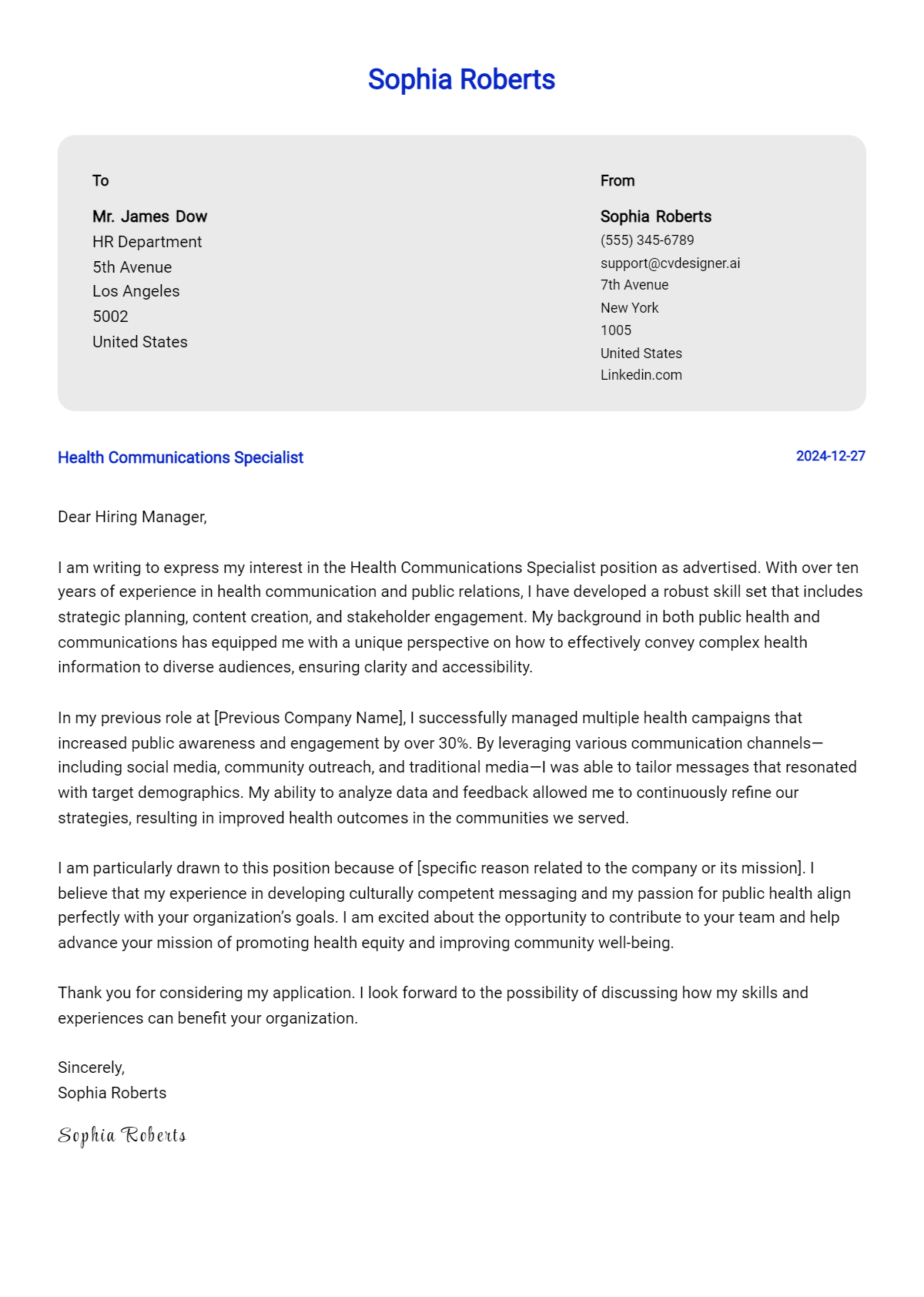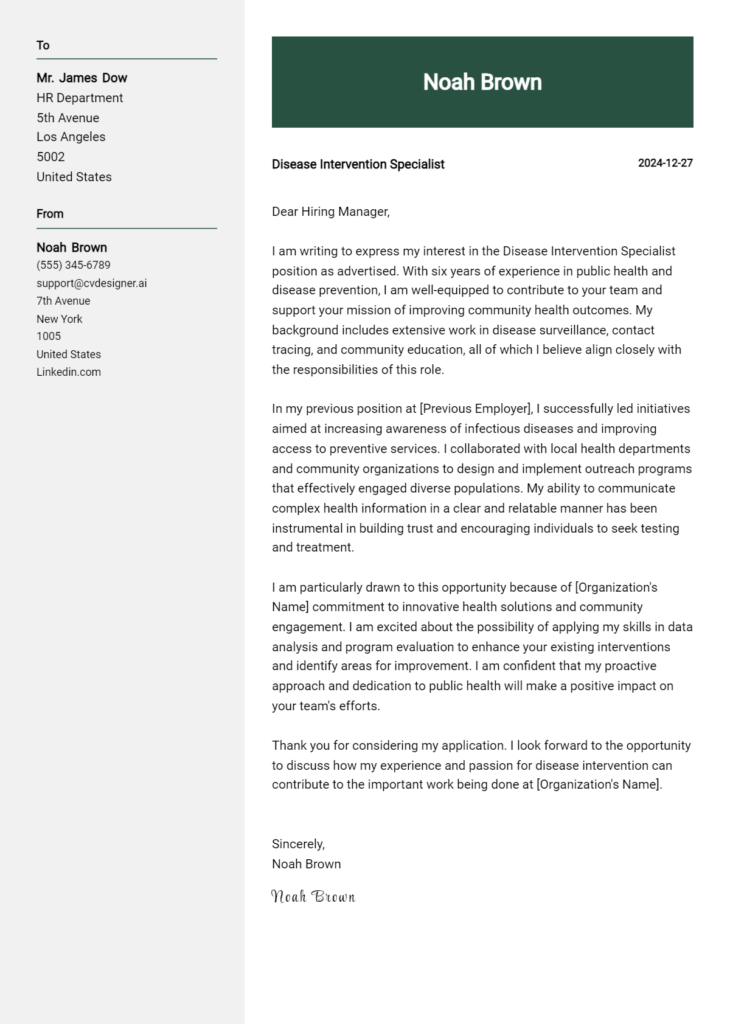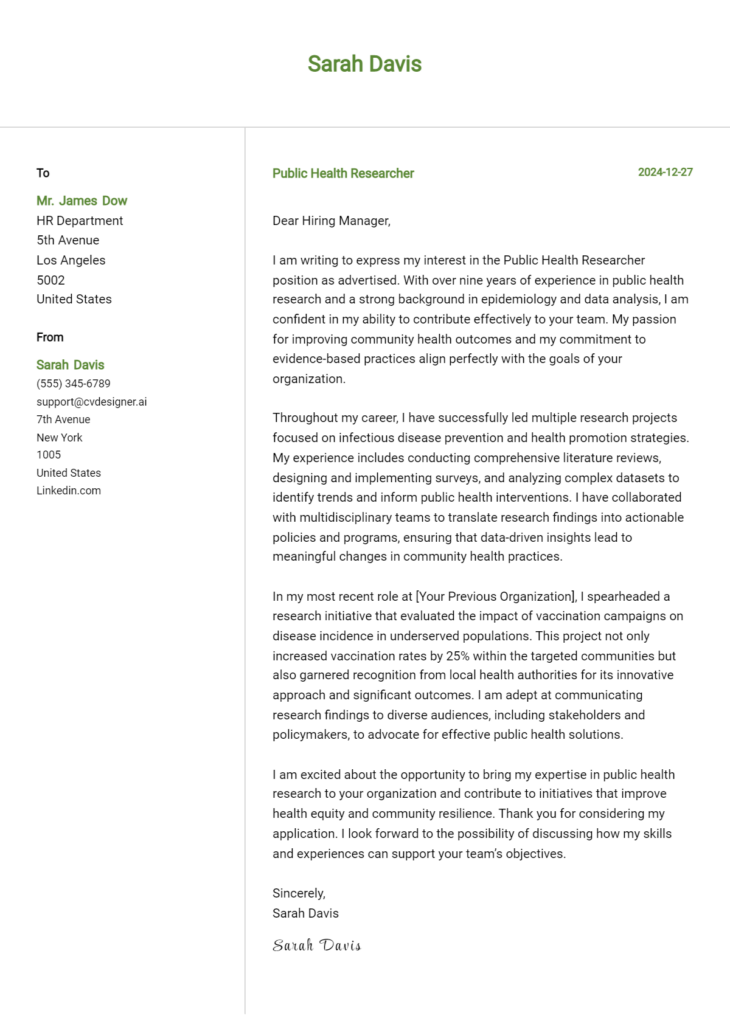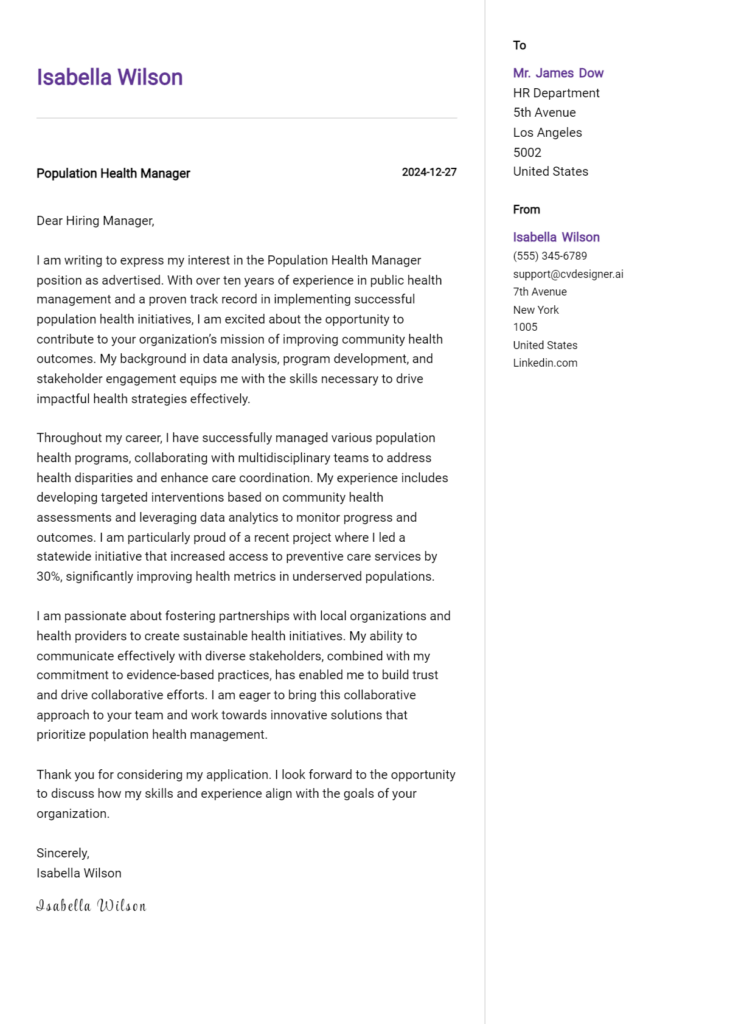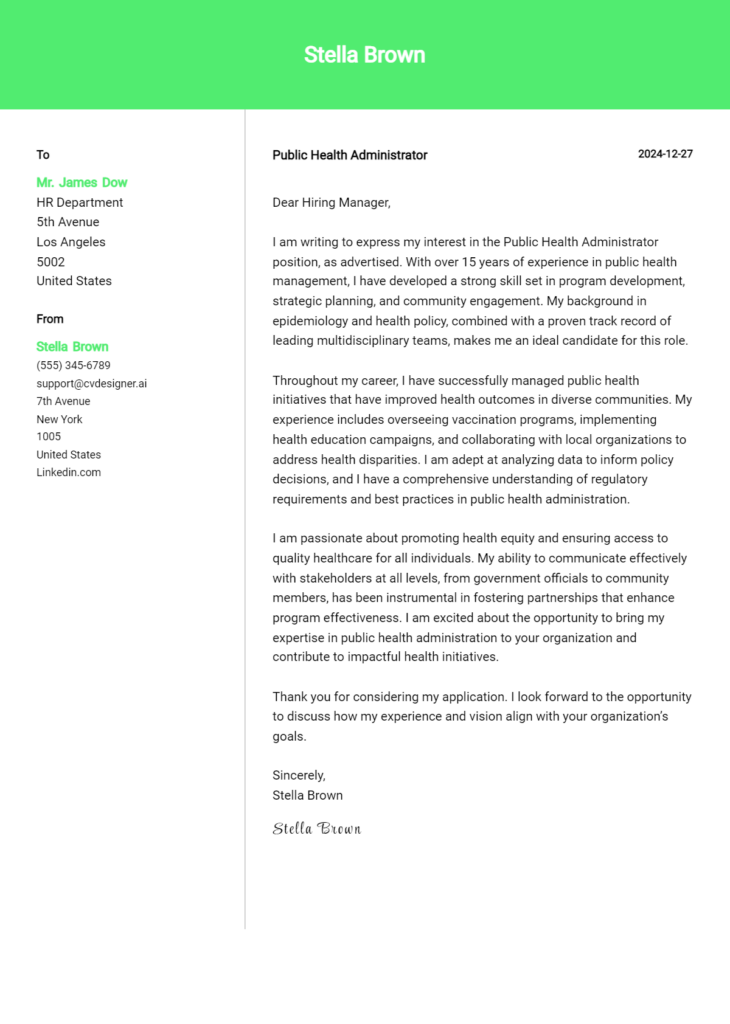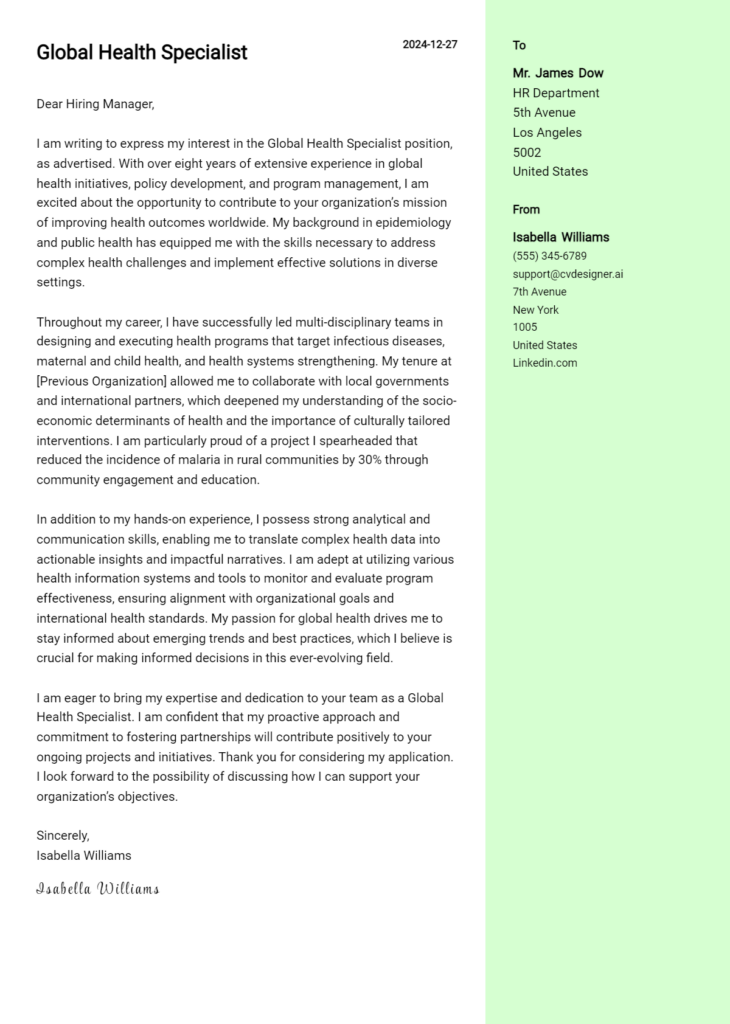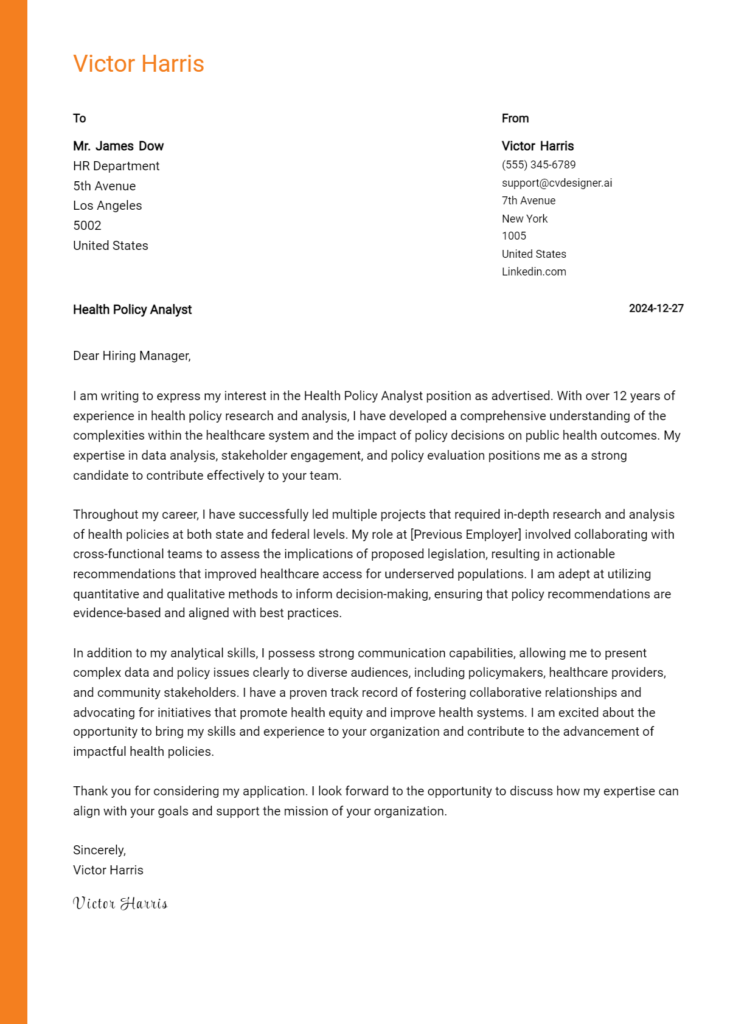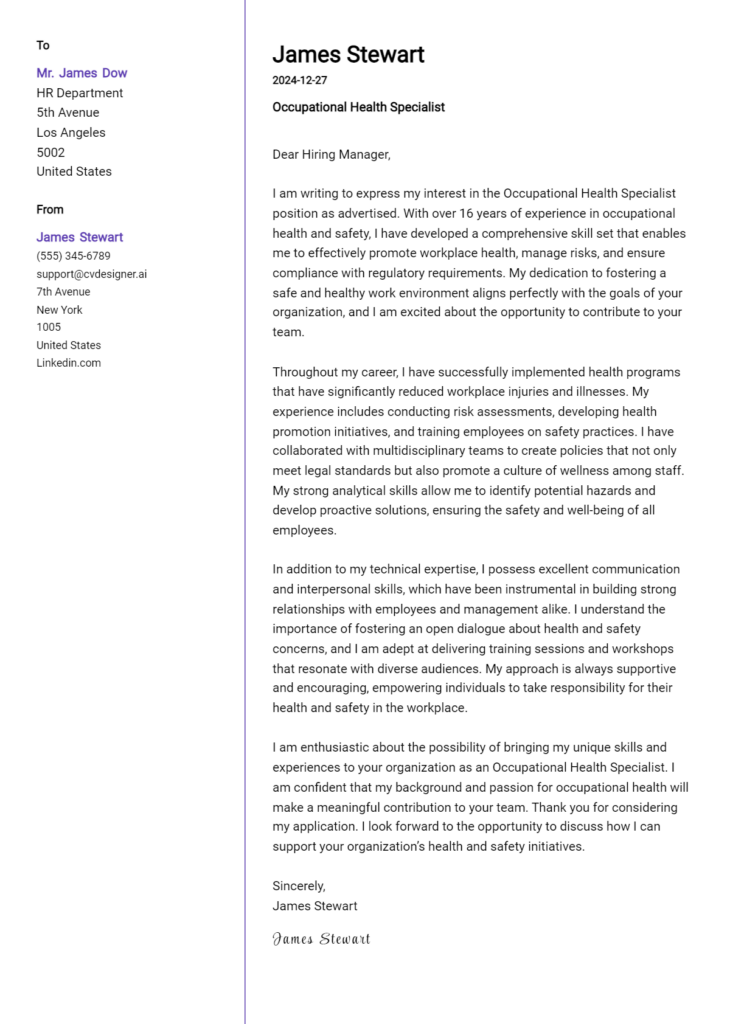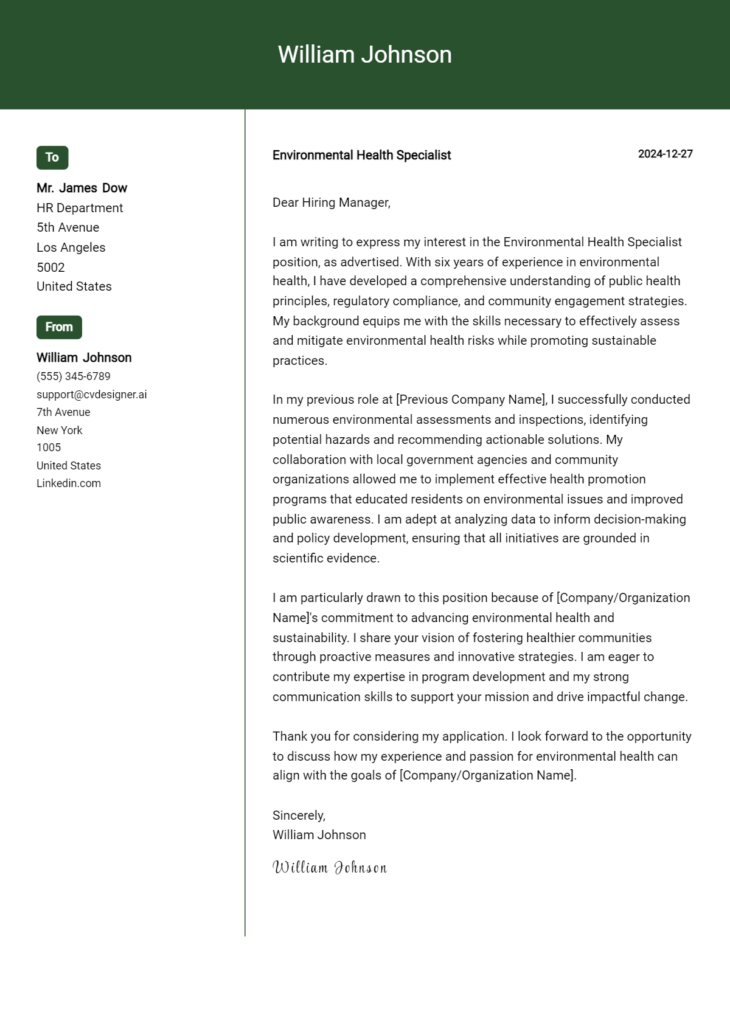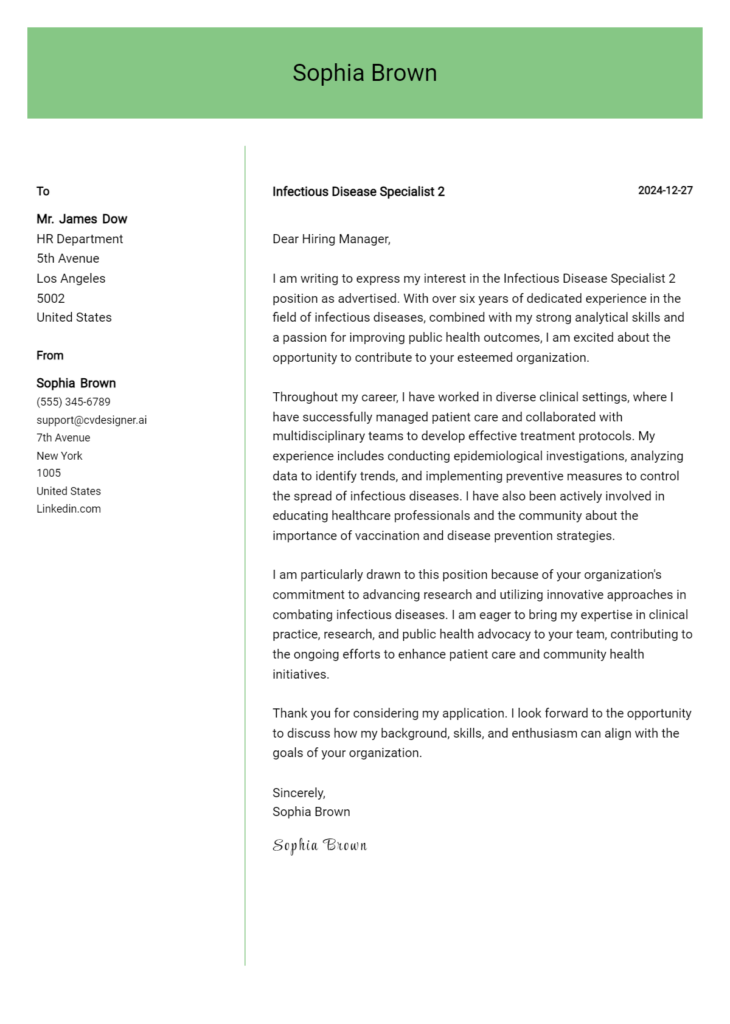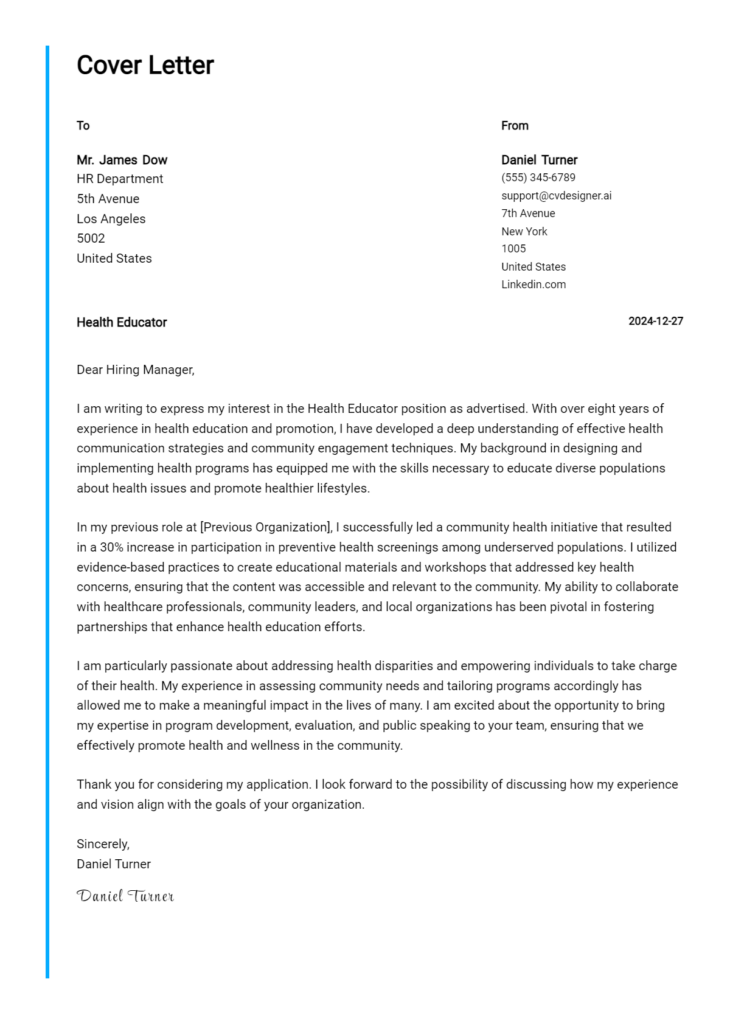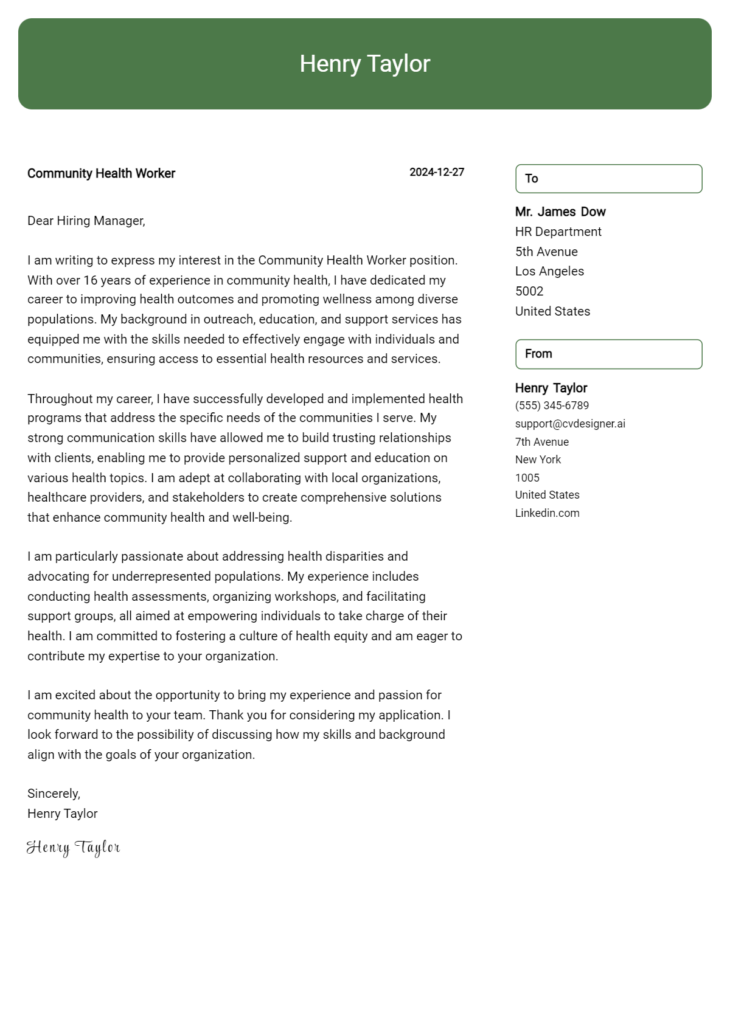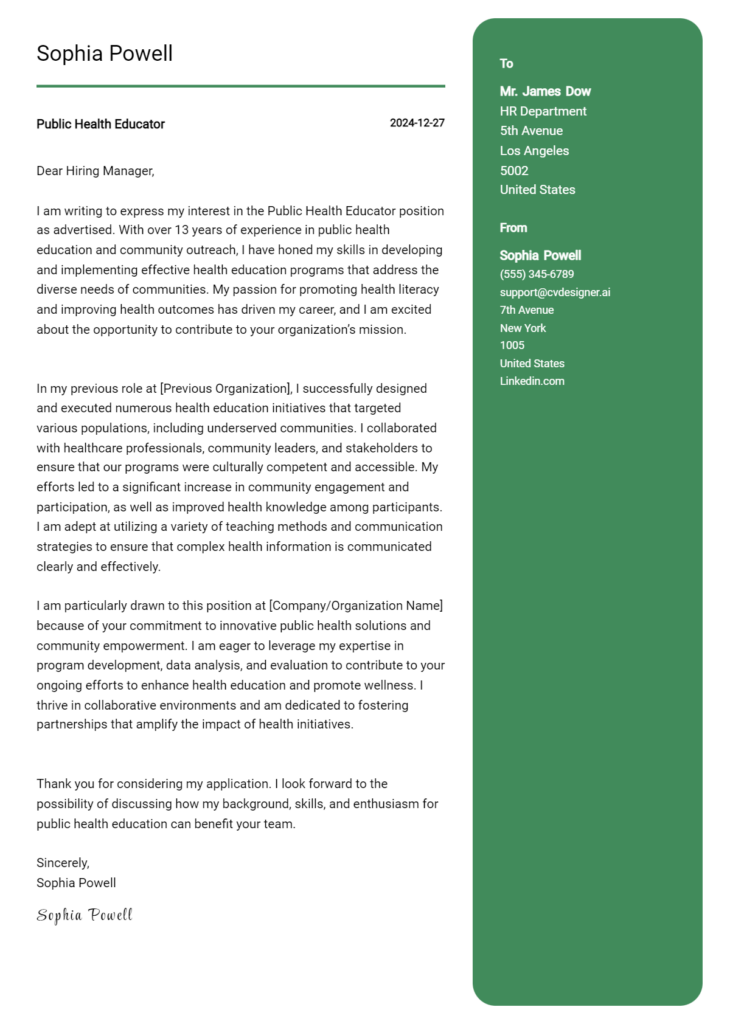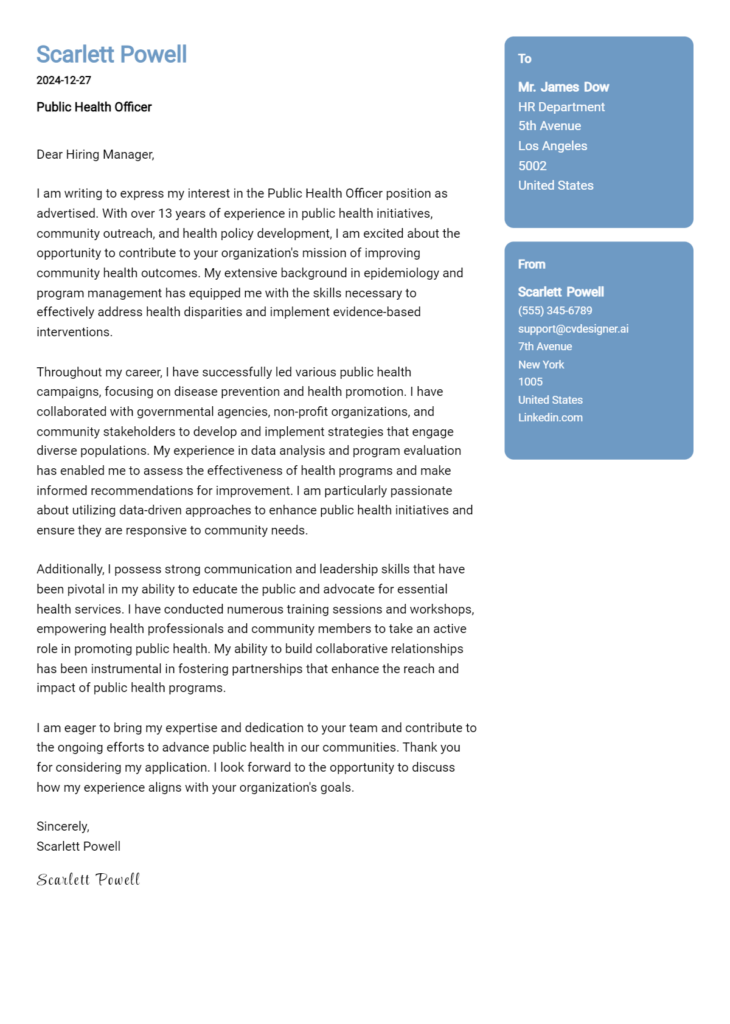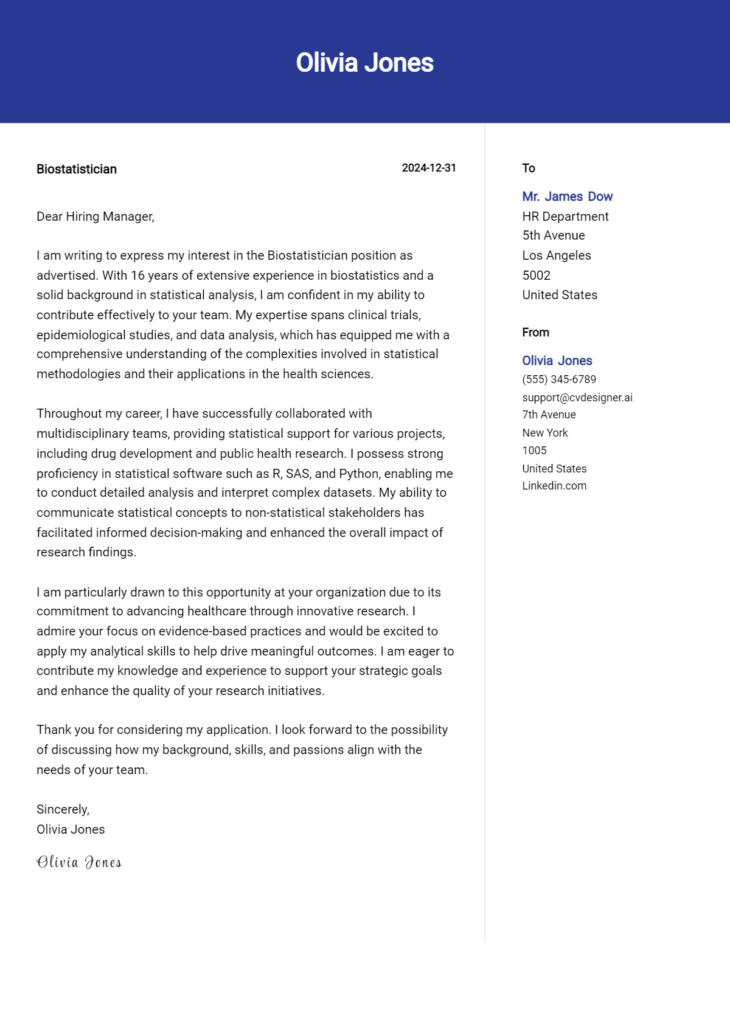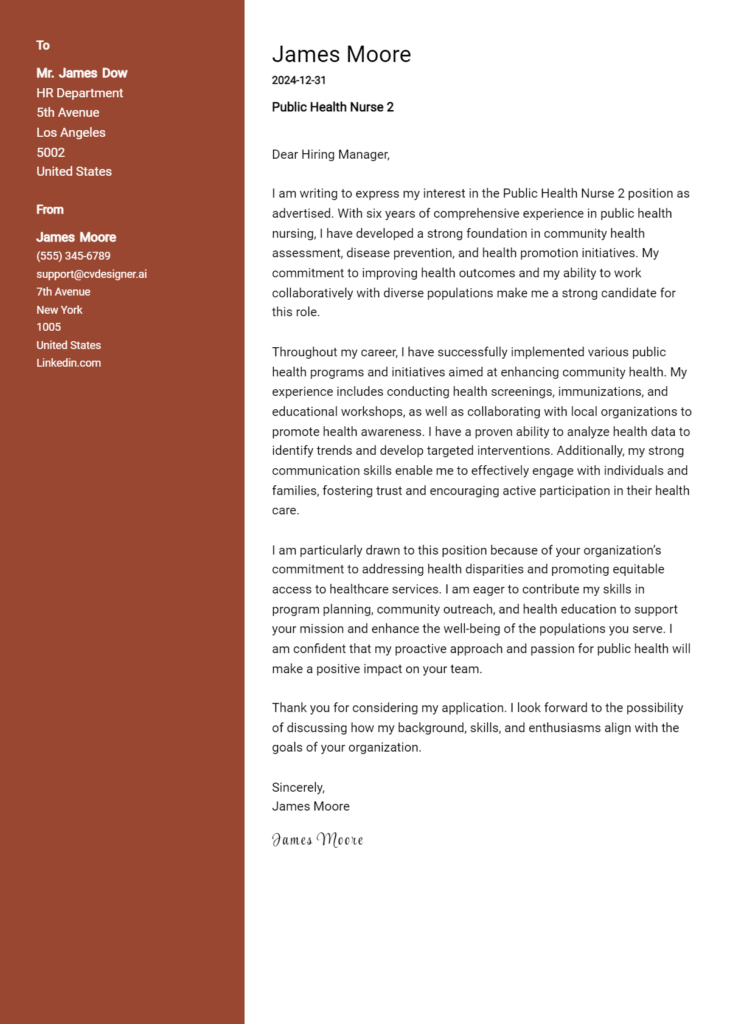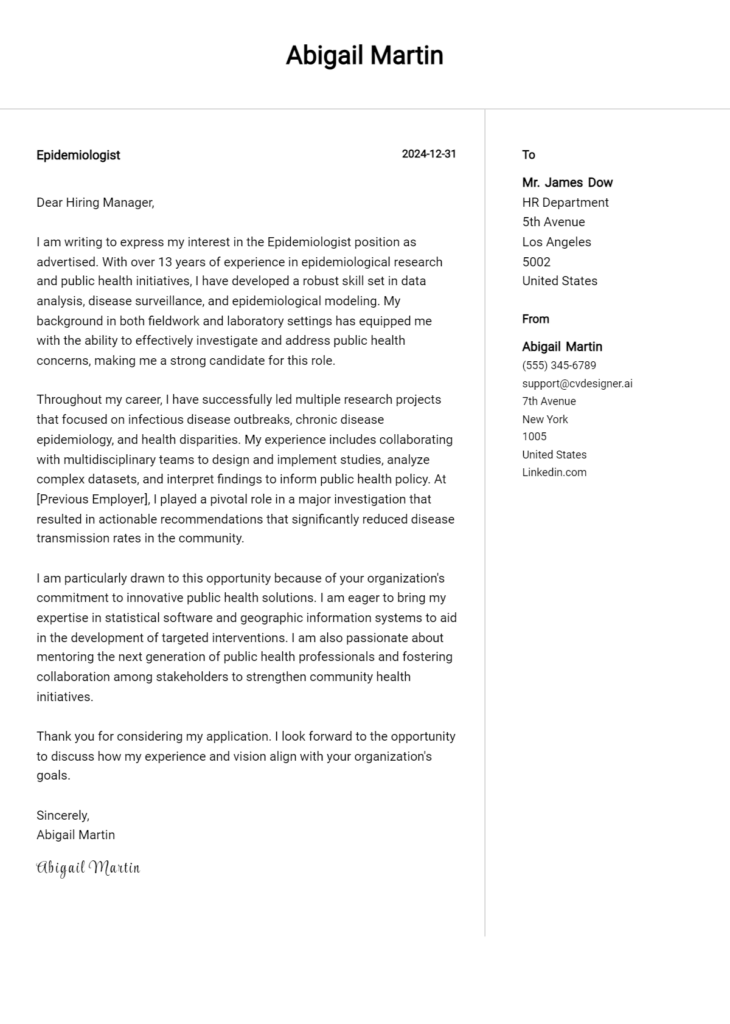Health Communications Specialist Cover Letter Examples
Explore additional Health Communications Specialist cover letter samples and guides and see what works for your level of experience or role.
How to Format a Health Communications Specialist Cover Letter?
Crafting an impactful cover letter is crucial for a Health Communications Specialist, as it serves as your first impression to potential employers. The way you format your cover letter can reflect your communication skills, creativity, and ability to convey complex information clearly and effectively. A well-organized cover letter not only captures the hiring manager's attention but also demonstrates your understanding of health communication strategies—a vital aspect of this role.
In this guide, we'll outline how to structure your cover letter, providing insights and examples tailored specifically for health communications professionals.
We'll focus on the essential components of a professional cover letter, including:
- Cover Letter Header
- Cover Letter Greeting
- Cover Letter Introduction
- Cover Letter Body
- Cover Letter Closing
Each section is instrumental in showcasing your qualifications and professionalism. Let’s break down each part to help you create a standout cover letter in the health communications field.
Importance of the Cover Letter Header for a Health Communications Specialist
The header of a cover letter is a crucial component that sets the tone for the rest of the document. For a Health Communications Specialist, clarity and professionalism in this section are essential as they reflect the candidate's attention to detail and understanding of effective communication—key attributes in the health communications field. A well-structured header should include the applicant's contact information, the date, and the recipient's details, ensuring that the letter is easily identifiable and accessible. This not only aids in organization but also demonstrates respect for the recipient's time.
Strong Example
Jane Doe 123 Health St. Wellness City, ST 12345 jane.doe@email.com (123) 456-7890 October 1, 2023 Mr. John Smith Director of Communications Health Organization 456 Care Ave. Health Town, ST 67890
Weak Example
jane doe wellness city 10/1/23 john smith
Importance of the Cover Letter Greeting
The greeting of a cover letter is crucial as it sets the tone for the entire document. A well-crafted greeting can convey professionalism and an understanding of the organization, while also providing a personal touch by addressing the hiring manager directly. This initial interaction serves as a first impression, making it essential to avoid generic salutations that can come across as impersonal. Researching the recipient's name, if available, demonstrates initiative and attention to detail, qualities that are highly valued in a Health Communications Specialist role.
To craft an effective greeting, consider the following tips: Always strive for personalization by using the hiring manager's name, and if that information isn't readily available, consider using a more specific title or department.
Strong Greeting Example
Dear Dr. Jane Smith,
Weak Greeting Example
To Whom It May Concern,
The Importance of a Well-Crafted Cover Letter Introduction for a Health Communications Specialist
A well-crafted cover letter introduction is crucial for a Health Communications Specialist as it sets the tone for the entire application. It serves as the first impression, capturing the hiring manager's attention and compelling them to read further. A strong introduction should express the candidate’s enthusiasm for the role while briefly showcasing relevant skills and achievements that align with the job requirements. This blend of passion and professionalism can make a significant difference in a competitive job market. Below are examples of both effective and ineffective introductions to illustrate this point.
Strong Example
Dear [Hiring Manager's Name], I am excited to apply for the Health Communications Specialist position at [Company Name], as I am passionate about translating complex health information into engaging and actionable content. With over five years of experience in public health communications and a proven track record of increasing community engagement by 30% through innovative social media campaigns, I am eager to bring my expertise to your team and contribute to your mission of promoting health literacy.
Weak Example
To Whom It May Concern, I am writing to apply for the position of Health Communications Specialist. I have some experience in communications and I think I could do a good job. I am interested in health topics and I believe I could learn a lot while working at your company.
Purpose of the Cover Letter Body for a Health Communications Specialist
The body of a cover letter for a Health Communications Specialist is essential as it allows the candidate to articulate their unique blend of skills and experiences while demonstrating their potential value to the organization. This section should highlight specific projects or accomplishments that showcase the candidate's ability to develop effective health communication strategies, engage diverse audiences, and utilize various platforms for outreach. By emphasizing quantifiable results, such as increased public awareness or successful campaign outcomes, the candidate can effectively illustrate their impact in previous roles.
Strong Example
In my previous role at XYZ Health Organization, I led a team in creating a public health campaign that increased screening rates for diabetes by 30% over six months. By conducting thorough audience research and utilizing social media platforms, we were able to engage over 10,000 individuals, providing them with vital information about diabetes prevention. My experience in developing clear, concise messaging and collaborating with healthcare professionals has equipped me with the tools necessary to effectively communicate complex health information to diverse audiences. I am eager to bring my expertise in health communication strategy and community engagement to your organization.
Weak Example
I have worked in health communications for a few years and have done some campaigns. I think I can help your company. I have experience writing and talking to people about health topics. I am very interested in this job and would like to work for you.
Importance of the Cover Letter Closing for a Health Communications Specialist
A strong closing paragraph in a cover letter is essential for a Health Communications Specialist, as it serves to summarize qualifications, reiterate enthusiasm for the position, and encourage the hiring manager to take the next steps. This final impression can significantly influence the decision-making process. A compelling conclusion leaves a lasting impact, while a weak closing may diminish the overall effectiveness of the application.
Strong Example
Thank you for considering my application for the Health Communications Specialist position. I am excited about the opportunity to leverage my extensive experience in public health messaging and community engagement to contribute to your team. I am eager to discuss how my skills align with your goals in promoting health initiatives. I look forward to the possibility of an interview and am happy to provide any additional information you may require.
Weak Example
I hope you look at my resume and consider me for the job. I guess I would be okay for the role. Thanks.
Crafting an effective cover letter for a Health Communications Specialist role is crucial for standing out in a competitive job market. A well-written cover letter not only introduces you to potential employers but also highlights your unique qualifications. It’s important to showcase your technical skills, problem-solving abilities, knowledge of the Software Development Life Cycle (SDLC), teamwork capabilities, and passion for continuous learning. Below are some tips to help you create a compelling cover letter that reflects your strengths and aligns with the demands of this vital role.
Tips for Writing an Effective Cover Letter
Highlight Relevant Technical Skills
Make sure to emphasize any specific technical skills related to health communications, such as proficiency in health informatics tools, data analysis software, or digital communication platforms. Tailor your examples to demonstrate how these skills have positively impacted previous projects or initiatives.Demonstrate Problem-Solving Abilities
Health communications often involves navigating complex issues. Share a specific example of a challenge you faced in a previous role and detail how you approached it. Highlight your analytical thinking and the strategies you implemented to find a solution, showcasing your ability to adapt and overcome obstacles.Showcase SDLC Knowledge
If you have experience with the Software Development Life Cycle, mention it explicitly. Discuss how you’ve contributed to any stages of the SDLC in previous roles, particularly in relation to health communication projects. This demonstrates your understanding of the processes involved in developing effective health communication tools and strategies.Emphasize Teamwork and Collaboration
Health communication is often a collaborative effort. Provide examples of how you’ve successfully worked within a team to achieve a common goal. Highlight your ability to communicate effectively with diverse stakeholders, as well as your role in fostering a positive and productive team environment.Express a Passion for Continuous Learning
The field of health communications is ever-evolving. Convey your commitment to professional development by mentioning any relevant certifications, workshops, or courses you’ve completed. Discuss how these experiences have equipped you with the latest trends and best practices in health communication, showing potential employers your dedication to staying current in the field.
For additional resources, consider utilizing cover letter templates or a cover letter builder to help structure and enhance your letter further. A polished and tailored cover letter will set the tone for a successful application process.
Common Mistakes to Avoid in a Health Communications Specialist Cover Letter
Crafting a compelling cover letter is essential for standing out in the competitive field of health communications. Avoiding common mistakes can significantly enhance your chances of landing an interview. Here are some frequent pitfalls to be aware of:
Generic Greetings: Using "To Whom It May Concern" can make your letter feel impersonal. Instead, research the hiring manager's name and address them directly.
Lack of Specificity: Failing to tailor your letter to the specific job can ensure it blends in with others. Highlight relevant experiences that align directly with the job description.
Ignoring Formatting Guidelines: A poorly formatted cover letter can distract from your qualifications. Follow established cover letter format to present your information clearly.
Repetition of Resume Content: Simply reiterating your resume doesn't add value. Instead, use your cover letter to elaborate on key achievements and how they relate to the role.
Overly Casual Language: While personality is important, maintaining a professional tone is crucial. Avoid slang and overly informal language to convey seriousness.
Neglecting to Proofread: Grammatical errors and typos can undermine your credibility. Always proofread your letter or have someone else review it before submission.
Failure to Conclude Effectively: A weak closing can leave a poor impression. End with a strong statement of interest and a call to action, expressing your eagerness to discuss your application further.
By steering clear of these common mistakes, you can create a more effective cover letter that showcases your qualifications for a Health Communications Specialist role. For inspiration, check out some cover letter examples to see how others have successfully captured their unique value.
Cover Letter FAQs for Health Communications Specialist
What should I include in my cover letter for a Health Communications Specialist position?
Your cover letter should include a brief introduction, outlining your interest in the Health Communications Specialist role and how you discovered the position. In the main body, highlight relevant experiences, such as your background in public health, communications, or media relations. Be sure to mention specific skills, like strategic communication planning, social media management, or health literacy initiatives, that align with the job requirements. Conclude with a strong closing statement expressing your enthusiasm for contributing to the organization and your desire for an interview.
How do I tailor my cover letter for a specific job?
To tailor your cover letter, start by carefully reading the job description to identify key skills and responsibilities specific to the position. Use these insights to customize your letter, focusing on experiences that are directly related to the role. Mention the organization’s initiatives or values, demonstrating your knowledge of their work and how it aligns with your professional goals. By personalizing your letter, you show that you are genuinely interested in the position and have taken the time to understand the organization's mission.
Should I include metrics or achievements in my cover letter?
Yes, including metrics or achievements in your cover letter can significantly enhance your application. Quantifiable results provide concrete evidence of your capabilities and accomplishments. For example, you might mention how you increased community engagement by 30% through a targeted health campaign or successfully managed a budget for a public health initiative. These specific examples not only demonstrate your effectiveness but also showcase your ability to produce tangible results, making your application stand out to hiring managers.
How long should my cover letter be?
Your cover letter should ideally be one page long, consisting of three to four paragraphs. This length allows you to convey your qualifications and enthusiasm without overwhelming the reader. Aim for concise, impactful language, focusing on the most relevant experiences and skills that match the job description. A well-structured letter that succinctly communicates your fit for the role will engage the hiring manager and encourage them to read your resume, increasing your chances of securing an interview.
Build your Cover Letter in minutes
Use an AI-powered cover letter builder and have your letter done in 5 minutes. Just select your template and our software will guide you through the process.

